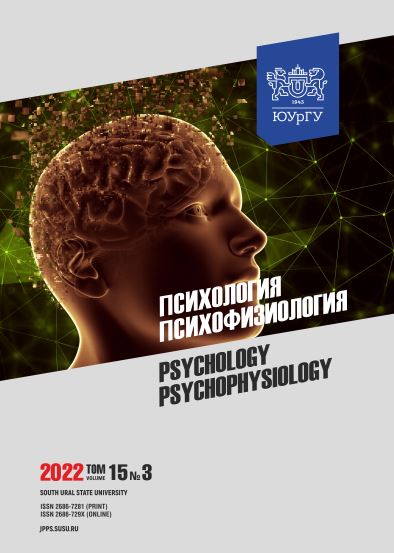The development of ideas about self in the psychodynamic theory of personality
Abstract
Introduction. The self is one of the central theoretical constructs in such modern psychodynamic areas as psychoanalytic psychology of the self, relational psychoanalysis, and intersubjective psychoanalysis. At the same time, this concept was introduced as an auxiliary one and often had a very different meaning in the works of different authors. Some authors tried to review the use of this concept, however, these studies were limited by their own theoretical goals, were of a narrow character, and also did not include attempts to understand the reasons for the self to become the central concept or the relationship between its increased importance and wider theoretical transformations. Aims. This paper provides the analysis of the self in the studies of different authors performed within a psychoanalytic perspective; the analysis of the contradictions of the meanings attributed to this concept, as well as its metapsychological explanations; the identification of the relationship between the meaning assigned to this concept and wider theoretical and technical changes that took place within psychoanalytic theories. Theoretical foundations. This study presents a theoretical conceptual analysis of scientific psychoanalytic literature. Results. The ideas about the self as attributed to this concept by different authors were identified. It was found that this concept had several meanings at different times and included: a description of psychophysiological integrity; an existential agent; a mental structure that determined the sense of the self and self-awareness. It was demonstrated that the dominant idea of the self as a concept included an integrative mental structure that was considered as the base of our experience of ourselves. Conclusion. The idea of the self as a mental structure that was the base of our experience of ourselves has become the central construct of the psychoanalytic theory of personality. The relationship between this idea and the phenomenological orientation of some psychoanalytic directions, their humanization and focus on the introspective-empathic method was demonstrated.
Downloads
References
2. Quinodoz J.-M. Chitaya Freyda [Reading Freud]. Moscow, Cogito-Centre. 2014:216. (in Russ.)
3. Freud S. Ya I Ono [Ego and Id]. Moscow, Eksmo-Press. 2017:160. (in Russ.)
4. Balint M. Bazisniy defect: Terapevticheskie aspekty regressii [Basic defect: Therapeutic aspects of regression]. Moscow, Cogito-Centre. 2002:255. (in Russ.)
5. Tyson R.L., Tyson Ph. Psihoanaliticheskie teorii razvitiya [Psychoanalytics theories of development]. Moscow, Cogito-Centre. 2013:407. (in Russ.)
6. Kernberg O. Tyazhelye lichnostnye rasstroystva [Severe personality disorders]. Moscow, Class. 2014:464. (in Russ.)
7. Nemirovsky K. Vinnikott I Kohut. Novye perspektivy v psihoanalize, psihoterapii I psihiatrii [Winnicott and Kohut. New Perspectives in Psychoanalysis, Psychotherapy and Psychiatry]. Moscow, Cogito-Centre. 2010:217. (in Russ.)
8. Kutter P., Muller T. Psihoanaliz. Vvedenie v psihologiyu bessoznatelnyh protsessov [Psychoanalysis. Introduction to the psychology of unconscious processes]. Moscow, Cogito-Centre. 2011:284. (in Russ.)
9. Spitz R. Psihoanaliz rannego detstva [Psychoanalysis of early childhood]. Moscow, Canon Plus. 2019:256. (in Russ.)
10. Mahler M., Bergman A., Pine F. Psihologicheskoe rozhdenie chelovecheskogo mladentsa. Simbioz i individuatsiya [The psychological birth of the human infant. Symbiosis and individuation]. Moscow, Cogito-Centre. 2018:413. (in Russ.)
Winnicott D.W. Ego distortion in terms of true and false self. Moskovskiy psihoterapevticheskiy zhurnal = Moscow psychotherapeutic journal. 2006;1:5–19. (in Russ.)
12. Kohut H. Analiz samosti [Analysis of the Self]. Moscow, Cogito-Centre. 2017:368. (in Russ.)
13. Kohut H. Vosstanovlenie samosti [The Restoration of the Self]. Moscow, Cogito-Centre. 2017:316. (in Russ.)
14. Stern D.N. Mezhlichnostniy mir rebyonka. Vzglyad s tochki zreniya psihoanaliza I psihologii razvitiya [The Interpersonal World of the Infant: A View from Psychoanalysis and Development]. Saint Petersburg, East European Institute of Psychoanalysis. 2006:384. (in Russ.)
15. Stolorow R. D., Brandchaft B., Atwood, G. Klinicheskiy psihoanaliz. Intersubyektivniy podhod [Psychoanalytic Treatment: An Intersubjective Approach]. Moscow, Cogito-Centre. 2011:256.
(in Russ.)
16. Stolorow R. D. Travma I chelovecheskoe suschestvovanie [Trauma and Human Existence]. Moscow, Cogito-Centre. 2016:120. (in Russ.)
References on translit
-Copyright (c) 2022 Psychology. Psychophysiology

This work is licensed under a Creative Commons Attribution-NonCommercial-NoDerivatives 4.0 International License.



